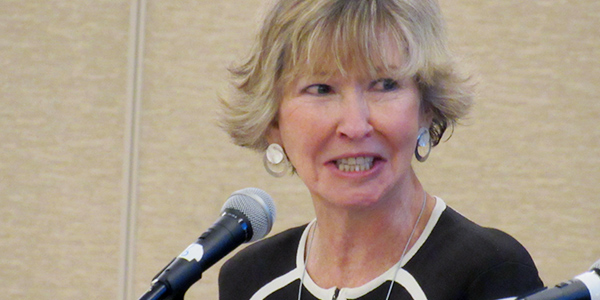By Amanda Durish Cook
INDIANAPOLIS — Regulators should preserve the multiple incentives currently offered to transmission developers — and possibly consider creating new ones, two former FERC commissioners said Monday.
Speaking on a panel at the National Association of Regulatory Utility Commissioners’ 2019 Summer Policy Summit, former Commissioners Suedeen Kelly and Philip Moeller expressed support for incentives granted on a case-by-case basis, but they said the time may be ripe to create new categories of adders to encourage development.
Entitled “(Trans)Mission Critical? Reconsidering FERC’s Electric Transmission Incentives,” the panel focused on the commission’s recent Notice of Inquiry into transmission rate incentives and the ensuing comments from transmission owners, load, utilities, regulators and trade groups. (See Tx Incentives NOI Brings Calls for Broader Reforms.)
Virginia State Corporation Commissioner Judith Jagdmann, the panel moderator, asked if regulators view the incentives as a “fist on the scale or a thumb on the scale.”
Kelly, now a partner with the law firm Jenner & Block, said the incentives were designed to be a thumb. “It was clear from the beginning that you couldn’t incent something where rates were no longer just and reasonable,” she said of FERC’s philosophy behind creating incentives.
She said there wasn’t much common ground on specific, standardized incentives as she and her fellow commissioners were developing Order 697, issued in 2006.
“We agreed that incentives were necessary. We didn’t agree on what certain projects should be incented and not others. We couldn’t agree on the particulars. If you look at the rule, it reflects that. … We put the burden on the developer when they came to us” with an application, Kelly said.
Moeller, now executive vice president at Edison Electric Institute, said the incentive applications that started to come in after the 2006 rulemaking were generally on par with the commission’s expectations.
“I actually dissented from many incentive requests, and through my dissent, I was trying to create my own incentive policy, Kelly recounted. “Some of my dissents were an inchoate wanting to know more about the challenges and the benefits.”
Save the RTO Adder
RTO adders are still an important piece of encouraging transmission investment, Kelly said, especially in the West and Southeast, where participation in organized markets is less common.
“RTO membership was clearly something that the commission was trying to encourage. I think it’s taken for granted now, but 15, 20 years ago, it was really something different,” Moeller said.
However, the lone panelist without a regulator background argued for eventual phaseout of the RTO adder.
“We were concerned that the RTO incentive packages were too easily granted. It was becoming routine,” American Public Power Association General Counsel Delia Patterson said.
She said FERC has struck more of a balance between consumers and investors since its 2012 policy statement on transmission incentives, which was crafted to create a more rigorous standard for requesting incentives. Still, she said RTO membership is too commonplace to warrant the incentive.
But Moeller said it remains fair, also adding that between 2006 and 2012, transmission buildout was appropriately robust.
“I thought we went too far in terms of cutting things back in 2012. But I agree that transmission investment is necessary. … It’s so doggone hard to build for the most part,” Moeller said.
Risky Business
Kelly agreed that transmission construction is a risky venture: “It’s a very difficult decision in a public company to put up capital and make a transmission investment.”
During her time on the New Mexico Public Regulation Commission, Kelly said, she agonized the most over transmission siting decisions. “Nobody wants to put a transmission line in their neighbor’s farm or yard or along the edge of a national forest. It’s not a pleasant job.”
Asked whether they would prefer a case-by-case review or standardized incentive approval, the former commissioners still prefer the former — although Kelly thinks “slam dunk” incentives should be made into a standard.
Patterson concurred on the need for case-by-case review. “I trust my daughter, Emily, to make sure to pack a balanced lunch, but it’s up to me to verify that,” she said to audience laughter.
Moeller said FERC might consider additional incentives for transmission systems that are reinforced against intensifying climate change.
“What’s the value of electricity when you don’t have it? Many, many, many times more.”






